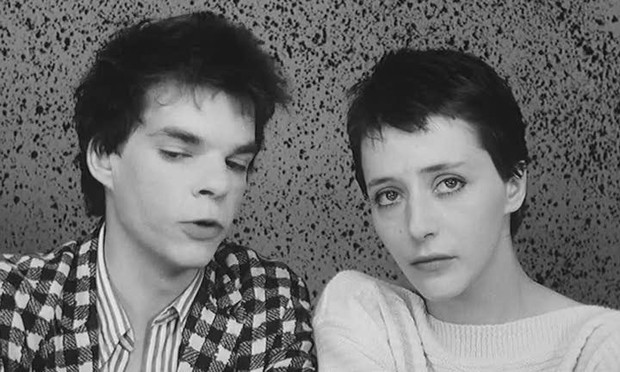HOUR OF THE WOLF (VARGTIMMEN) (Ingmar Bergman, 1968)
Film Society of Lincoln Center, Elinor Bunin Munroe Film Center
Francesca Beale Theater
144 West 65th St. between Broadway & Amsterdam Ave.
Saturday, December 14, 6:45, and Thursday, December 19, 9:15
Festival runs December 13-19
212-875-5601
www.filmlinc.com
 One of Ingmar Bergman’s most critically polarizing films — the director himself wrote, “No, I made it the wrong way” three years after its release — Hour of the Wolf is a gripping examination of an artist’s psychological deterioration. Bergman frames the story as if it’s a true tale being told by Alma Borg (Liv Ullmann) based on her husband Johan’s (Max von Sydow) diary, which she has given to the director. In fact, as this information is being shown in words onscreen right after the opening credits, the sound of a film shoot being set up can be heard behind the blackness; thus, from the very start, Bergman is letting viewers know that everything they are about to see might or might not be happening, blurring the lines between fact and fiction in the film itself as well as the story being told within. And what a story it is, a gothic horror tale about an artist facing both a personal and professional crisis, echoing the life of Bergman himself. Johan and Alma, who is pregnant (Ullmann was carrying Bergman’s child at the time), have gone to a remote island where he can pursue his painting in peace and isolation. But soon Johan is fighting with a boy on the rocks, Alma is getting a dire warning from an old woman telling her to read Johan’s diary, and the husband and wife spend some bizarre time at a party in a castle, where a man walks on the ceiling, a dead woman arises, and other odd goings-on occur involving people who might be ghosts. Bergman keeps the protagonists and the audience guessing as to what’s actually happening throughout: The events could be taking place in one of the character’s imaginations or dreams (or nightmares), they could be flashbacks, or they could be part of the diary come to life. Whatever it is, it is very dark, shot in an eerie black-and-white by Sven Nykvist, part of a trilogy of grim 1968-69 films by Bergman featuring von Sydow and Ullmann that also includes Shame and The Passion of Anna. Today, Hour of the Wolf feels like a combination of Roman Polanski’s Rosemary’s Baby and Stanley Kubrick’s The Shining with elements of Mozart’s The Magic Flute — which Bergman would actually adapt for the screen in 1975 and features in a key, extremely strange scene in Hour of the Wolf. But in Bergman’s case, all work and no play does not make him a dull boy at all. Hour of the Wolf is screening December 14 and 19 at the Elinor Bunin Munroe Film Center as part of the Film Society of Lincoln Center series “Liv & Ingmar: The Films,” being held in conjunction with the theatrical release of Dheeraj Akolkar’s poetic new documentary, Liv & Ingmar; the festival continues with such other Ullmann/Bergman pairings as Autumn Sonata, Shame, Persona, and Cries and Whispers.
One of Ingmar Bergman’s most critically polarizing films — the director himself wrote, “No, I made it the wrong way” three years after its release — Hour of the Wolf is a gripping examination of an artist’s psychological deterioration. Bergman frames the story as if it’s a true tale being told by Alma Borg (Liv Ullmann) based on her husband Johan’s (Max von Sydow) diary, which she has given to the director. In fact, as this information is being shown in words onscreen right after the opening credits, the sound of a film shoot being set up can be heard behind the blackness; thus, from the very start, Bergman is letting viewers know that everything they are about to see might or might not be happening, blurring the lines between fact and fiction in the film itself as well as the story being told within. And what a story it is, a gothic horror tale about an artist facing both a personal and professional crisis, echoing the life of Bergman himself. Johan and Alma, who is pregnant (Ullmann was carrying Bergman’s child at the time), have gone to a remote island where he can pursue his painting in peace and isolation. But soon Johan is fighting with a boy on the rocks, Alma is getting a dire warning from an old woman telling her to read Johan’s diary, and the husband and wife spend some bizarre time at a party in a castle, where a man walks on the ceiling, a dead woman arises, and other odd goings-on occur involving people who might be ghosts. Bergman keeps the protagonists and the audience guessing as to what’s actually happening throughout: The events could be taking place in one of the character’s imaginations or dreams (or nightmares), they could be flashbacks, or they could be part of the diary come to life. Whatever it is, it is very dark, shot in an eerie black-and-white by Sven Nykvist, part of a trilogy of grim 1968-69 films by Bergman featuring von Sydow and Ullmann that also includes Shame and The Passion of Anna. Today, Hour of the Wolf feels like a combination of Roman Polanski’s Rosemary’s Baby and Stanley Kubrick’s The Shining with elements of Mozart’s The Magic Flute — which Bergman would actually adapt for the screen in 1975 and features in a key, extremely strange scene in Hour of the Wolf. But in Bergman’s case, all work and no play does not make him a dull boy at all. Hour of the Wolf is screening December 14 and 19 at the Elinor Bunin Munroe Film Center as part of the Film Society of Lincoln Center series “Liv & Ingmar: The Films,” being held in conjunction with the theatrical release of Dheeraj Akolkar’s poetic new documentary, Liv & Ingmar; the festival continues with such other Ullmann/Bergman pairings as Autumn Sonata, Shame, Persona, and Cries and Whispers.
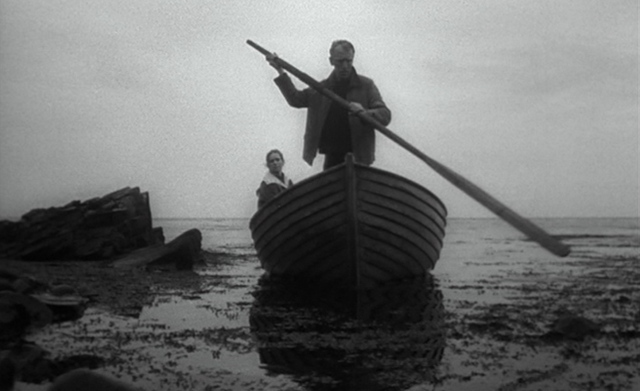
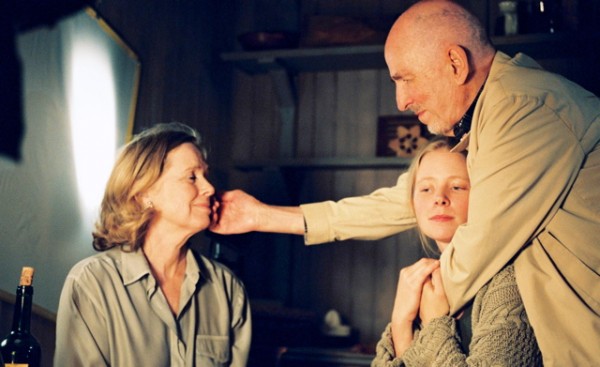
 In Saraband, masterful writer-director Ingmar Bergman returns to the story of Marianne (Liv Ullmann) and Johan (Erland Josephson), first brought to life in the heartbreaking Scenes from a Marriage in 1973. Marianne, who hasn’t seen her ex-husband in thirty years, suddenly decides to pay the aging recluse a visit, resurrecting emotions both good and bad. Shot digitally, what purports to be Bergman’s swan song looks more like a TV movie than a theatrical release; in fact, it was made for Swedish television, as was the earlier work, but this one contains far less energy. While there are moments of brilliance, there are also scenes of mediocrity and mundanity that fall flat. The framing device of having Marianne speaking directly to the camera as she looks at old photos detracts from the overall impact as well. But it is great to see Josephson and Ullmann together again. The most fascinating new character, and one that fits well in the Bergman oeuvre, could very well be Henrik (Borje Ahlstedt), a complex, scary man with serious problems between him and his father as well as with his daughter, Karin (Julia Dufvenius). Saraband is screening December 14 and 18 at the Elinor Bunin Munroe Film Center as part of the Film Society of Lincoln Center series “Liv & Ingmar: The Films,” being held in conjunction with the theatrical release of Dheeraj Akolkar’s poetic new documentary, Liv & Ingmar; the festival continues with such other Ullmann/Bergman pairings as The Passion of Anna, Face to Face, Cries and Whispers, and Scenes from a Marriage.
In Saraband, masterful writer-director Ingmar Bergman returns to the story of Marianne (Liv Ullmann) and Johan (Erland Josephson), first brought to life in the heartbreaking Scenes from a Marriage in 1973. Marianne, who hasn’t seen her ex-husband in thirty years, suddenly decides to pay the aging recluse a visit, resurrecting emotions both good and bad. Shot digitally, what purports to be Bergman’s swan song looks more like a TV movie than a theatrical release; in fact, it was made for Swedish television, as was the earlier work, but this one contains far less energy. While there are moments of brilliance, there are also scenes of mediocrity and mundanity that fall flat. The framing device of having Marianne speaking directly to the camera as she looks at old photos detracts from the overall impact as well. But it is great to see Josephson and Ullmann together again. The most fascinating new character, and one that fits well in the Bergman oeuvre, could very well be Henrik (Borje Ahlstedt), a complex, scary man with serious problems between him and his father as well as with his daughter, Karin (Julia Dufvenius). Saraband is screening December 14 and 18 at the Elinor Bunin Munroe Film Center as part of the Film Society of Lincoln Center series “Liv & Ingmar: The Films,” being held in conjunction with the theatrical release of Dheeraj Akolkar’s poetic new documentary, Liv & Ingmar; the festival continues with such other Ullmann/Bergman pairings as The Passion of Anna, Face to Face, Cries and Whispers, and Scenes from a Marriage.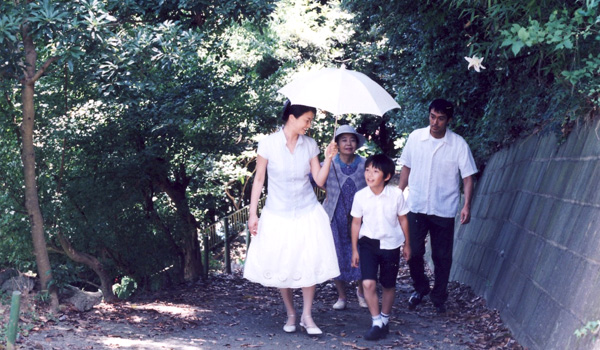
 Flawlessly written, directed, and edited by Hirokazu Kore-eda (Maborosi, Nobody Knows), Still Walking follows a day in the life of the Yokoyama family, which gathers together once a year to remember Junpei, the eldest son who died tragically. The story is told through the eyes of the middle child, Ryota (Hiroshi Abe), a forty-year-old painting restorer who has recently married Yukari (Yui Natsukawa), a widow with a young son (Shohei Tanaka). Ryota dreads returning home because his father, Kyohei (Yoshio Harada), and mother, Toshiko (Kirin Kiki), are disappointed in the choices he’s made, both personally and professionally, and never let him escape from Junpei’s ever-widening shadow. Also at the reunion is Ryota’s chatty sister, Chinami (You), who, with her husband and children, is planning on moving in with her parents in order to take care of them in their old age (and save money as well). Over the course of twenty-four hours, the history of the dysfunctional family and the deep emotions hidden just below the surface slowly simmer but never boil, resulting in a gentle, bittersweet narrative that is often very funny and always subtly powerful. The film is beautifully shot by Yutaka Yamazaki, who keeps the camera static during long interior takes — it moves only once inside the house — using doorways, short halls, and windows to frame scenes with a slightly claustrophobic feel, evoking how trapped the characters are by the world the parents have created. The scenes in which Kyohei walks with his cane ever so slowly up and down the endless outside steps are simple but unforgettable. Influenced by such Japanese directors as Mikio Naruse, Yasujiro Ozu, and Shohei Imamura, Kore-eda was inspired to make the film shortly after the death of his parents; although it is fiction, roughly half of Toshiko’s dialogue is taken directly from his own mother. Still Walking is a special film, a visual and psychological marvel that should not be missed. It’s screening December 11-12 as part of the Film Society of Lincoln Center festival “Ozu and His Afterlives,” which honors the 110th anniversary of the master filmmaker’s birth and the 50th anniversary of his death; he died on his birthday at the age of sixty in 1963. The series features Ozu’s
Flawlessly written, directed, and edited by Hirokazu Kore-eda (Maborosi, Nobody Knows), Still Walking follows a day in the life of the Yokoyama family, which gathers together once a year to remember Junpei, the eldest son who died tragically. The story is told through the eyes of the middle child, Ryota (Hiroshi Abe), a forty-year-old painting restorer who has recently married Yukari (Yui Natsukawa), a widow with a young son (Shohei Tanaka). Ryota dreads returning home because his father, Kyohei (Yoshio Harada), and mother, Toshiko (Kirin Kiki), are disappointed in the choices he’s made, both personally and professionally, and never let him escape from Junpei’s ever-widening shadow. Also at the reunion is Ryota’s chatty sister, Chinami (You), who, with her husband and children, is planning on moving in with her parents in order to take care of them in their old age (and save money as well). Over the course of twenty-four hours, the history of the dysfunctional family and the deep emotions hidden just below the surface slowly simmer but never boil, resulting in a gentle, bittersweet narrative that is often very funny and always subtly powerful. The film is beautifully shot by Yutaka Yamazaki, who keeps the camera static during long interior takes — it moves only once inside the house — using doorways, short halls, and windows to frame scenes with a slightly claustrophobic feel, evoking how trapped the characters are by the world the parents have created. The scenes in which Kyohei walks with his cane ever so slowly up and down the endless outside steps are simple but unforgettable. Influenced by such Japanese directors as Mikio Naruse, Yasujiro Ozu, and Shohei Imamura, Kore-eda was inspired to make the film shortly after the death of his parents; although it is fiction, roughly half of Toshiko’s dialogue is taken directly from his own mother. Still Walking is a special film, a visual and psychological marvel that should not be missed. It’s screening December 11-12 as part of the Film Society of Lincoln Center festival “Ozu and His Afterlives,” which honors the 110th anniversary of the master filmmaker’s birth and the 50th anniversary of his death; he died on his birthday at the age of sixty in 1963. The series features Ozu’s 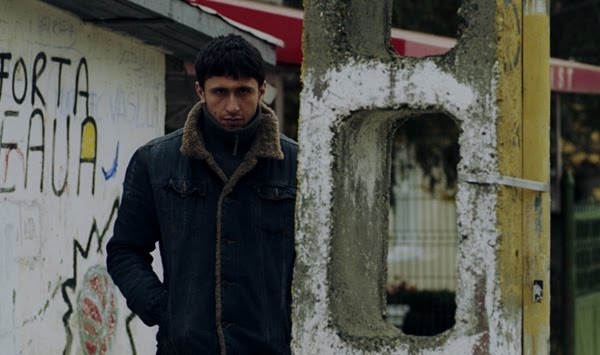
 The first half of Corneliu Porumboiu’s Police, Adjective is as dreadfully boring as Detective Cristi’s (Dragos Bucur) assignment, tailing a student, Victor (Radu Costin), who enjoys a joint with two of his friends every day after school. While Cristi wants to nail the kid’s supplier, the cop’s boss has him on a tight deadline, insisting he arrest Victor if the investigation continues to go nowhere, but Cristi strongly disagrees with putting the teenager away for up to seven years for a crime he believes will soon be abolished by the government. However, the film picks up considerably as Cristi seeks help from various contacts, getting caught up in red tape and public servants who would really rather not be bothered. And when he get called in by the chief (Vlad Ivanov from 4 Months, 3 Weeks, and 2 Days) and gets a long lecture in linguistics, well, you won’t be able to control yourself from laughing out loud. Porumboiu keeps the pace very slow and very steady, but hang in there, because the end is a riot. Police, Adjective, which won the Un Certain Regard Jury Prize at the Cannes Film Festival, screened at the New York Film Festival and at MoMA as part of the “Contenders, 2009,” series, and was Romania’s official entry for the Foreign Language Film Academy Award, is being shown December 2 at 3:00 at the Francesca Beale Theater as part of the Film Society of Lincoln Center series “Making Waves: New Romanian Cinema 2013,” which runs November 29 to December 3 and consists of works dating from 1962 to 2013 by such directors as Calin Peter Netzer, Nae Caranfil, Tom Wilson, Adrian Sitaru, Laura Capatana-Juller, Dan Pita, and Mircea Veroiul. Also on the schedule are the rest of Porumboiu’s films, including 12:08 East of Bucharest, the shorts trio Liviu’s Dream, A Trip to the City, and Gone with the Wine, and his latest, the closing-night selection When Evening Falls on Bucharest or Metabolism, which is being presented December 3 at 6:00 and will be followed by a Q&A with the director.
The first half of Corneliu Porumboiu’s Police, Adjective is as dreadfully boring as Detective Cristi’s (Dragos Bucur) assignment, tailing a student, Victor (Radu Costin), who enjoys a joint with two of his friends every day after school. While Cristi wants to nail the kid’s supplier, the cop’s boss has him on a tight deadline, insisting he arrest Victor if the investigation continues to go nowhere, but Cristi strongly disagrees with putting the teenager away for up to seven years for a crime he believes will soon be abolished by the government. However, the film picks up considerably as Cristi seeks help from various contacts, getting caught up in red tape and public servants who would really rather not be bothered. And when he get called in by the chief (Vlad Ivanov from 4 Months, 3 Weeks, and 2 Days) and gets a long lecture in linguistics, well, you won’t be able to control yourself from laughing out loud. Porumboiu keeps the pace very slow and very steady, but hang in there, because the end is a riot. Police, Adjective, which won the Un Certain Regard Jury Prize at the Cannes Film Festival, screened at the New York Film Festival and at MoMA as part of the “Contenders, 2009,” series, and was Romania’s official entry for the Foreign Language Film Academy Award, is being shown December 2 at 3:00 at the Francesca Beale Theater as part of the Film Society of Lincoln Center series “Making Waves: New Romanian Cinema 2013,” which runs November 29 to December 3 and consists of works dating from 1962 to 2013 by such directors as Calin Peter Netzer, Nae Caranfil, Tom Wilson, Adrian Sitaru, Laura Capatana-Juller, Dan Pita, and Mircea Veroiul. Also on the schedule are the rest of Porumboiu’s films, including 12:08 East of Bucharest, the shorts trio Liviu’s Dream, A Trip to the City, and Gone with the Wine, and his latest, the closing-night selection When Evening Falls on Bucharest or Metabolism, which is being presented December 3 at 6:00 and will be followed by a Q&A with the director.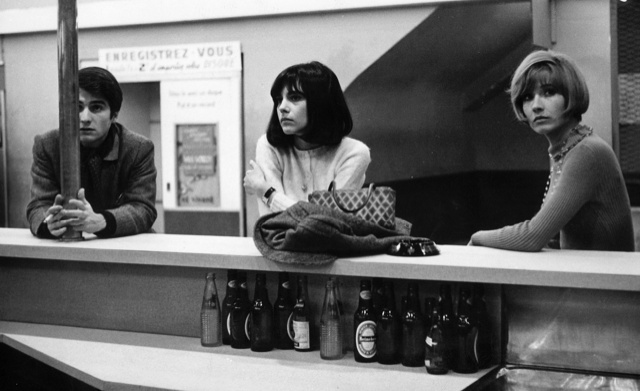
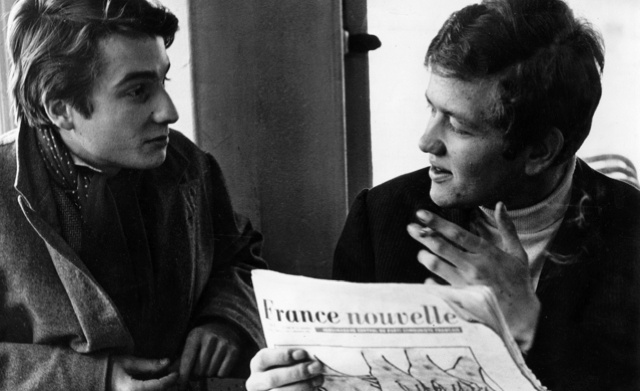
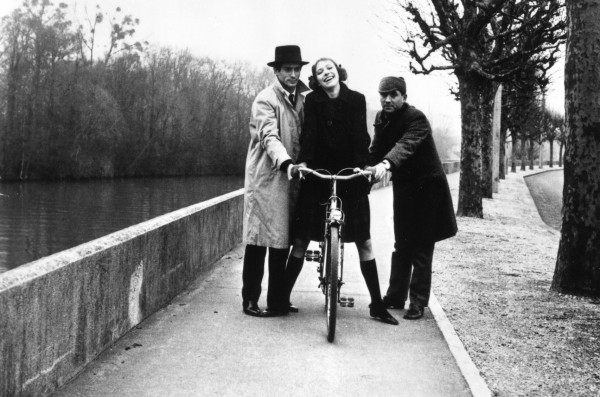
 When a pair of disaffected Parisians, Arthur (Claude Brasseur) and Franz (Sami Frey), meet an adorable young woman, Odile (Anna Karina), in English class, they decide to team up and steal a ton of money from a man living in Odile’s aunt’s house. As they meander through the streets of cinematographer Raoul Coutard’s black-and-white Paris, they talk about English and wealth, dance in a cafe while director Jean-Luc Godard breaks in with voice-over narration about their character, run through the Louvre in record time, and pause for a near-moment of pure silence. Godard throws in plenty of commentary on politics, the cinema, and the bourgeoisie in the midst of some genuinely funny scenes. Band of Outsiders is no ordinary heist movie; based on Dolores Hitchens’s novel Fool’s Gold, it is the story of three offbeat individuals who just happen to decide to attempt a robbery while living their strange existence, as if they were outside from the rest of the world. The trio of ne’er-do-wells might remind Jim Jarmusch fans of the main threesome from Stranger Than Paradise (1984), except Godard’s characters are more aggressively persistent. One of Godard’s most accessible films, Band of Outsiders is screening October 18 at the Francesca Beale Theater as part of the expansive Film Society of Lincoln Center series “Jean-Luc Godard — The Spirit of the Forms,” which continues through October 31 with such other Godard works as Les Carabiniers, La Chinoise, Contempt, Film Socialisme, King Lear, Nôtre musique, and many more.
When a pair of disaffected Parisians, Arthur (Claude Brasseur) and Franz (Sami Frey), meet an adorable young woman, Odile (Anna Karina), in English class, they decide to team up and steal a ton of money from a man living in Odile’s aunt’s house. As they meander through the streets of cinematographer Raoul Coutard’s black-and-white Paris, they talk about English and wealth, dance in a cafe while director Jean-Luc Godard breaks in with voice-over narration about their character, run through the Louvre in record time, and pause for a near-moment of pure silence. Godard throws in plenty of commentary on politics, the cinema, and the bourgeoisie in the midst of some genuinely funny scenes. Band of Outsiders is no ordinary heist movie; based on Dolores Hitchens’s novel Fool’s Gold, it is the story of three offbeat individuals who just happen to decide to attempt a robbery while living their strange existence, as if they were outside from the rest of the world. The trio of ne’er-do-wells might remind Jim Jarmusch fans of the main threesome from Stranger Than Paradise (1984), except Godard’s characters are more aggressively persistent. One of Godard’s most accessible films, Band of Outsiders is screening October 18 at the Francesca Beale Theater as part of the expansive Film Society of Lincoln Center series “Jean-Luc Godard — The Spirit of the Forms,” which continues through October 31 with such other Godard works as Les Carabiniers, La Chinoise, Contempt, Film Socialisme, King Lear, Nôtre musique, and many more.